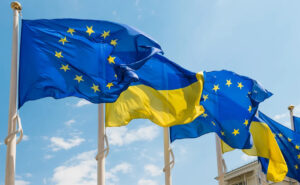
European Union leaders, noting Ukraine’s fulfillment of the conditions for opening negotiation clusters on EU accession, did not take the relevant decision due to Hungary’s position.
This follows from a statement on the conclusions agreed upon by 26 EU member states, except Hungary, following the consideration of the Ukrainian issue at the European Council meeting in Brussels on Thursday.
“The European Council reaffirms the EU’s unwavering support for Ukraine’s path to EU membership and welcomes the significant progress Ukraine has made so far under the most difficult circumstances,” the statement on the conclusions says.
In this regard, the European Council called on Ukraine, the Council, and the Commission to continue working on the accession process in accordance with a merit-based approach.
“The fundamental issues cluster will be opened first and closed last, and the clusters will be opened after the conditions have been met, in accordance with the enlargement methodology. The European Council takes note of the Commission’s assessment that the fundamental issues, internal market, and external relations clusters are ready to be opened,” the statement said.
The European Council will return to this issue at its next meeting.
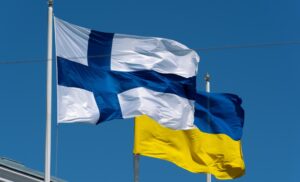
The Finnish government has decided to allocate €100 million for the purchase of weapons from the US for transfer to Ukraine, Prime Minister Petteri Orpo announced on Thursday.
“On Thursday, the government decided to allocate €100 million to support Ukraine by purchasing weapons from the US. This is a NATO-coordinated support package called PURL. Finland is participating in a joint support package for the Baltic and Northern European countries, which is planned to be delivered to Ukraine in the near future,” the Finnish prime minister said, as quoted by the Helsingin Sanomat newspaper.
“The situation in Ukraine is critical. Yes, we must participate. We cannot stand aside when all the countries of Northern Europe and the Baltic States are involved,” he stressed.
According to Orpo, the funding will be provided through external borrowing and Finland’s budget will not be revised, “even though it will increase the debt.”
The initiative to finance the purchase of American weapons for Ukraine came after the US administration refused to continue supplying weapons to Kyiv free of charge. In August, four packages of American weapons were prepared for a total amount of about $2 billion. The financing was provided by Germany, Denmark, Canada, the Netherlands, Norway, and Sweden.
On August 15, at a meeting of NATO defense ministers in Brussels, Estonia, Latvia, Lithuania, Belgium, Luxembourg, Finland, and Iceland announced their decision to join the program. In October, Spain also announced its participation.
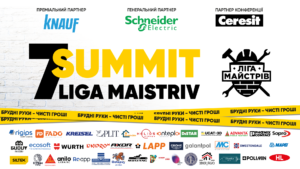
On October 24, 2025, the 7th annual congress of construction industry professionals, SUMMIT 7 2025, organized by Ukraine’s largest platform for builders, the League of Masters, will take place in Kyiv at the VDNG (Pavilion No. 9 “KIT”). The event will bring together more than 1,000 participants from various specializations and will become a key point for the exchange of experience, networking, and industry development. The general sponsor of the event is SCHNEIDER ELECTRIC.
Main events of SUMMIT 7 2025:
The purpose of the event
To promote and enhance the prestige of the construction profession, establish communication between market participants, support veterans who are planning to change professions, and find new suppliers and partners for managers of specialized institutions.
Registration
Admission is free for veterans after registration: https://forms.office.com/e/bfS9BbZJai
SUMMIT 7 2025 partners are powerful manufacturers and suppliers: Distar, TM Buduy, Ceresit, Knauf, Onteplo, Schneider Electric, Polimin, Axor, EcoSoft, Kreisel, Grohe, the KNUBA Veterans Institute, and others.
SUMMIT 7 2025 is a unique opportunity for professionals, students, veterans, and managers of specialized institutions to join in the development of the construction industry, find new partners and suppliers, and increase their own expertise.
Interfax-Ukraine — information partner
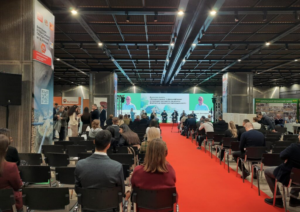
The problem of a shortage of experienced personnel is becoming increasingly acute for Ukrainian farmers, particularly in livestock farming. This was reported by Oksana Yurchenko, project coordinator at the FAO Investment Center in Ukraine, during the Ukrainian Livestock Summit 2025, which took place on October 17 in Kyiv.
This year, the Ukrainian Livestock Summit 2025, organized by ProAgro, brought together more than 600 participants: farmers, producers, and scientists. International delegations were present at the summit. Throughout the event, the International Feed School operated within the summit, and the Livestock Expo 2025 exhibition was held, where companies presented innovative solutions for efficient production.
“Even before the war, the problem of staff shortages was one of the main ones, as evidenced by the results of surveys of agricultural enterprises. And with the start of the full-scale invasion, it has intensified significantly. In 2023, more than 80% of farms noted that it was becoming increasingly difficult not only to find “fresh” specialists, but also to fill critical vacancies for the enterprise in general,” commented Oksana Yurchenko.

The expert is convinced that this issue will only become more acute. Therefore, it is obvious that there will be more automation of processes—it is impossible to avoid this. Salaries in the agricultural sector will also increase — only under such conditions is there a chance to retain qualified specialists. However, this is not enough:
“Employees need to be not only motivated but also developed,” she stressed.
According to Oksana Yurchenko, after the start of the full-scale invasion, Ukrainian farmers found themselves in a kind of information vacuum, with most of the available educational materials being in Russian or English, while there was virtually no high-quality content in Ukrainian.
A significant step towards meeting the needs of farmers was the launch of AgriAcademy, a modern educational platform that already offers more than 30 practical courses created in collaboration with leading universities around the world, agricultural companies, and industry experts in Ukraine.
“When a person comes to work, they need to be provided with a decent salary, as well as explanations, demonstrations, and training. This is precisely the function that AgriAcademy performs—it enables employees to deepen their knowledge,” emphasized the FAO project coordinator for animal health and food safety.
Currently, the platform offers over 30 different free certified courses in the field of cultivation, storage, and processing of industrial crops, organic production, various aspects of animal husbandry, etc. You can register for a course and obtain a certificate here: https://agriacademy.org/courses-catalog/
By the end of 2026, AgriAcademy plans to launch about 20 new courses, selected based on their relevance to the needs of Ukrainian agricultural producers.
This is a free professional online learning platform created on the initiative of the EBRD as part of its food security support program in Ukraine. Its goal is to strengthen the competitiveness and sustainable development of agriculture, which has suffered significant losses due to the war.
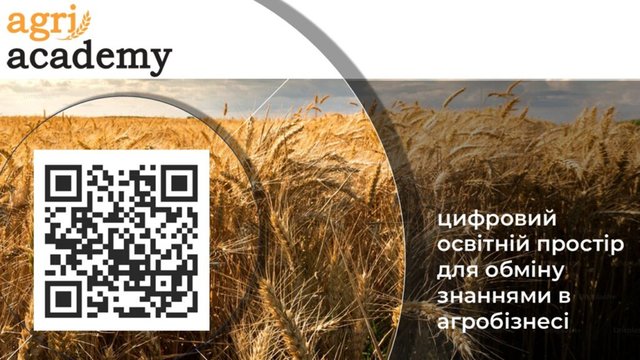
The creation and management of the platform (including the development of courses, training tours, etc.) is carried out with the support and funding of the EBRD, as well as:
The EBRD’s Multilateral Donor Account for Stabilisation and Sustainable Growth in Ukraine (donors: Denmark, Finland, France, Germany, Italy, Japan, the Netherlands, Norway, Poland, Sweden, Switzerland, the United Kingdom, the United States and the European Union as the largest donor);
The Republic of Ireland through the EBRD Small Business Promotion Fund (other donors to the fund: Italy, Japan, South Korea, Luxembourg, Norway, Sweden, Switzerland, Taipei China, and the United States);
The Food and Agriculture Organization of the United Nations (FAO).

McDonald’s plans to open 11 restaurants in Ukraine in 2026, according to Vitaliy Stefurak, McDonald’s development director in Ukraine.
“Next year, we plan to open at least 11 restaurants. And in 2027-28, we expect to accelerate the development of the chain to 15 new establishments per year. We see prospects for development in Ukraine, so we are working to gradually increase investment,” he told the Interfax-Ukraine news agency.
According to Stefurak, nine openings were planned for 2025, but the plan was adjusted. De facto, in 2025, the chain will expand by 11 new establishments, and three new and one renovated restaurants will be opened by the end of the year. Last year, UAH 1.8 billion was invested in the development and renovation of the chain, and this year, about UAH 2 billion.
In 2025, the company achieved its goal by opening restaurants in the Zakarpattia region, the last region where McDonald’s had not previously been represented. As for future locations, according to the development director, the focus will be on increasing the number of restaurants in cities where the chain is already present.
“Our priority areas for development are Kyiv, cities with a population of over one million, regional centers and their satellites (provided there is sufficient traffic), as well as locations on popular highways. Today, we are concentrating on central and western Ukraine,” he said.
He named popular tourist locations as one of the promising areas (at the end of 2023, the chain opened a restaurant in Yaremche). “We will have the final decisions on the development plan for 2026 at the beginning of the year, but I will lift the veil a little: yes, next year there may be new establishments in tourist centers in western Ukraine,” Stefurak said.
The first McDonald’s restaurant in Ukraine was built on May 24, 1997, in Kyiv. Currently, 117 restaurants are operating in Ukraine, while another 15 restaurants are closed due to safety requirements.
According to YouControl, McDonald’s in Ukraine received UAH 9.9 billion in revenue in the first half of 2025, which is 26.9% more than in the same period last year. Net profit decreased to UAH 845.314 million compared to UAH 874.762 million in the first half of 2024.
The owner of PII “McDonald’s Ukraine Ltd.” is listed as MCD Europe Limited (100%, London, UK).
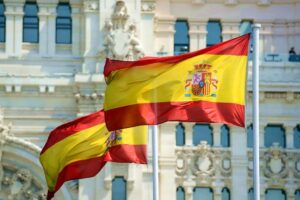
Spain has agreed to join the PURL project to purchase American weapons for Ukraine, Prime Minister Pedro Sánchez said in response to renewed criticism from US President Donald Trump over Spain’s unwillingness to increase military spending.
“We are a reliable country,” Sanchez said upon arrival at the European Council, where he also confirmed that Spain would purchase weapons from the US for Ukraine, El Pais reported on Thursday.
According to the publication, the country will participate in the US arms supply program (PURL), but the exact amount that Madrid is willing to spend has not yet been determined.